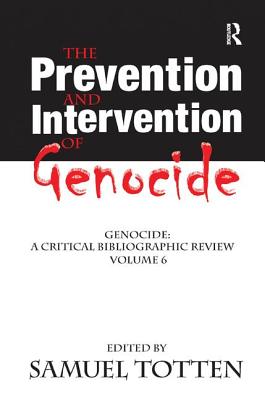

 Routledge
Routledge
The Prevention and Intervention of Genocide


Key Metrics
- Samuel Totten
- Routledge
- Paperback
- 9781138516755
- -
- -
- Political Science > Reference
- English
 Secure Transaction
Secure TransactionBook Description
Over the last twenty years the world has witnessed four major genocides. There was the genocide in Iraq (1988), in Rwanda (1994), in Srebrenica (1995), and in Darfur (2003 and continuing). Most observers agree there is an urgent need to assess the international community's efforts to prevent genocide and to intervene (once a genocide is under way) in an effective and timely manner. This volume, the latest in a widely respected series on the subject of genocide, provides an overview of a host of issues germane to this task.
The book begins with a cogent discussion of the issues of prevention and intervention during the Cold War years. The second chapter discusses the abject failures and moderate (though, in some cases, highly controversial) successes at prevention and intervention carried out in the 1990s and early 2000s. Further chapters examine latest efforts to develop an effective genocide early warning system and examine the complexity of and barriers to prevention. The pros and cons of sanctions and the problems of enforcement and evaluation their effectiveness are then discussed. Conflicts between state sovereignty and the protection of threatened populations are examined both in historical context and by incorporating the latest thinking.
Later chapters treat the issue of intervention; why and how it has met with only limited success. Concentrating on Rwanda and Srebrenica, chapter 8 discusses various peace operations that were abject failures and those that were moderately successful. The concept of an anti-genocide regime is examined in terms of progress in developing such a regime as well as what the international community must do in order to implement it. Chapters discuss key issues related to post-genocidal periods, those that need to be addressed in order to establish stability in a wounded land and populace as well as to prevent future genocides. The final chapter asks whether bringing perpetrators to justice has any impact in breaking impunity, ensuring deterrence, and bringing about reconciliation.
The contributors to the volume are all noted scholars, some of whom specialize in the study of genocide, and others who specialize in such areas as early warning, peacekeeping, and sanctions.
Author Bio
Samuel Totten is Professor Emeritus at the University of Arkansas, Fayetteville. He is a longtime scholar of genocide studies. In 2004 he served as one of 24 investigators with the U.S. State Department-sponsored Atrocities Documentation Project, interviewing refugees from Darfur in refugee camps along the Chad/Darfur, Sudan border.
The data collected in the interviews were used by then U.S. Secretary of State Colin Powell to ascertain whether genocide had or had not been perpetrated in Darfur. On September 9, 2004, acknowledging the work of the ADP team, Powell informed the U.S. Senate Foreign Relations Committee that Sudan had perpetrated genocide in Darfur and was possibly still doing so. On his own over the next five years Totten continued to interview refugees from Darfur.
The results of that research is delineated in his book An Oral and Documentary History of the Darfur Genocide (Praeger Security International Press, 2011). From 2010 through today, Totten has focused on both the genocide by attrition perpetrated by the Government of Sudan against the people of the Nuba Mountains (late 1980s/1990s) and, more recently, the current war in the State of South Kordofan.
Thus far, two books have resulted from the latter research: Genocide by Attrition, Second Edition (Transaction Publishers, 2015), and Conflict in the Nuba Mountains: From Genocide by Attrition to the Contemporary Crisis in Sudan (Routledge, 2015). He holds a Doctor of Education degree from Columbia University in New York City.
Source: TheConversation.com
Videos






Community reviews
Write a ReviewNo Community reviews